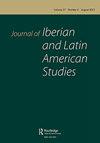从自由有机体论到社会公民权
IF 0.3
0 HUMANITIES, MULTIDISCIPLINARY
Journal of Iberian and Latin American Studies
Pub Date : 2023-01-02
DOI:10.1080/14701847.2023.2184010
引用次数: 0
摘要
本文旨在探讨西班牙社会公民身份形成的历史谱系和过程。由于它起源于19世纪的社会改良主义,因此它产生的原因及其产生的影响需要分析。这一分析清楚地表明,社会改良主义的出现是古典自由个人主义想象的内部危机及其随后在有机主义术语中的重构的结果。鉴于自由主义政权无法实现所承诺的社会、经济和和谐的平等主义政治秩序,新的个人主义有机体推动采用新的方式来实现这一目标。最重要的是宣布社会改革,这需要国家干预经济和劳资关系。随着时间的推移,这些改革措施将获得社会权利的条件,并产生所谓的社会公民制度。本文章由计算机程序翻译,如有差异,请以英文原文为准。
From liberal organicism to social citizenship
ABSTRACT The aim of this article is to explore the historical genealogy and the process by which social citizenship was constituted in Spain. Because its origins lie in nineteenth -century social reformism, the reasons why it appeared and the repercussions it had require analysis. This analysis clearly reveals that social reformism emerged as the result of the internal crisis of the imaginary of classical liberal individualism and its ensuing reframing in organicist terms. Given the incapacity of the liberal regime to attain the promised social, economic, and harmonious egalitarian political order, the new individualist organicism promoted the adoption of new ways of reaching this objective. The most important was the announcement of social reforms, which required state intervention in economic and labour relations. With time, these measures of reform would acquire the condition of social rights and give rise to the institution of so-called social citizenship.
求助全文
通过发布文献求助,成功后即可免费获取论文全文。
去求助
来源期刊

Journal of Iberian and Latin American Studies
HUMANITIES, MULTIDISCIPLINARY-
CiteScore
0.40
自引率
33.30%
发文量
23
 求助内容:
求助内容: 应助结果提醒方式:
应助结果提醒方式:


